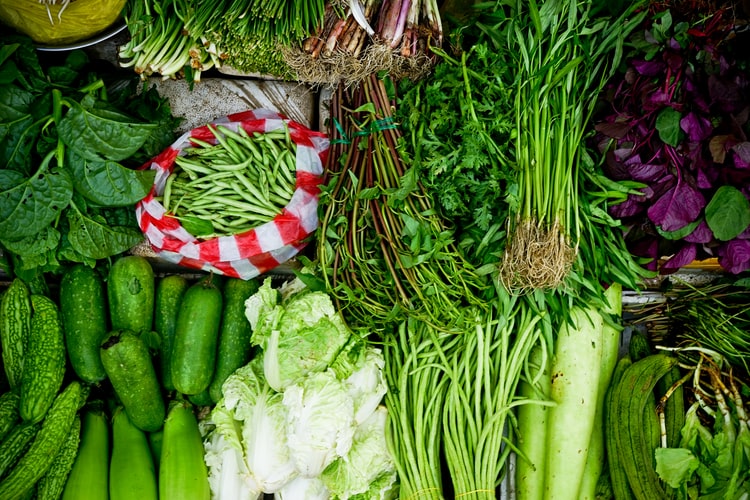
There are a number of lifestyle choices you can make to keep you and your veins healthy. By maintaining a healthy weight, exercising regularly, and eating a balanced diet, you can keep your veins healthy. It’s important to note that eating certain foods will not eliminate your varicose veins or prevent them from forming. Rather, these foods increase your fiber intake, decrease your sodium intake, add vitamins into your diet, promote overall health, and ultimately, help avoid putting unnecessary pressure on veins.
The vein valves in your legs are responsible for carrying blood back to your heart, but because they push blood upward, they have to work against gravity. Over time, veins can become weak and damaged, they get stretched out, sag, and are unable to fully close. Blood flows backward and pools in the vein, which can create a varicose vein. These are the dark, bulging, rope-like cords you see under the surface of your skin.
When you eat healthy foods, you can more easily maintain a healthy weight. Obesity is one of the top causes of varicose veins because that extra weight can put a lot of pressure on your veins, which can cause them to weaken and become damaged. By incorporating the following foods and vitamins into your daily diet, you can relieve your veins of excess pressure.
Vitamin C is a powerful antioxidant that promotes healthy blood circulation. It helps reduce inflammation, as well as produce collagen and elastin. When veins are under pressure, they rely on that collagen and elastin to help them contract and dilate correctly. Without adequate vitamin C, your veins are not as flexible. Fortunately, it’s very easy to add vitamin C into your daily life! Incorporate the following foods into your diet:
There are a wide variety of B vitamins that help improve circulation and reduce the levels of cholesterol in your blood. These vitamins include thiamin, riboflavin, niacin, folate (folic acid), vitamin B6, vitamin B12, vitamin B3, biotin, and pantothenic acid. If you have a history of blood clots in your family, it’s recommended that you focus on eating vitamins B12 and B6 in particular. You should also include B3 in your diet, which has been shown to improve circulation while reducing cholesterol. Incorporate the following foods into your diet:
Vitamin E is necessary to reduce the “stickiness” of platelets, and it prevents them from sticking together and clinging to the side of blood vessel walls. This is particularly helpful for individuals who are at high risk of developing conditions such as blood clots and type 1 diabetes. Incorporate the following foods into your diet:
We all know that fiber helps build a healthy digestive tract. However, when it comes to vein health, fiber offers additional benefits. By increasing your fiber intake, you prevent your body from absorbing unhealthy fats or building up cholesterol, both of which can accumulate in your vascular system and increase your chances of vein problems. According to the USDA, women should consume between 21-25 grams of fiber each day, while men should consume between 31-38 grams. Incorporate the following foods into your diet:
Have you ever heard of rutin? It’s a flavonoid that adds color to foods like berries, and it’s also an antioxidant that reduces inflammation caused by damaged veins. Rutin can even help prevent blood clots! Instead of taking ruin supplements, incorporate the following foods into your diet:
The American Heart Association recommends no more than 1,500 mg of sodium each day. But the average American eats over 3,400 mg of sodium each day, and over 70% of that sodium comes from packaged or restaurant foods; not the salt shaker. Foods high in sodium can cause your body to retain fluid, which can place extra pressure on veins. Read nutrition labels, avoid processed foods, and enjoy fresh fruits, vegetables, nuts, fish, poultry, and whole grains as often as you can.
It’s crucial that you stay hydrated. Water is the key to a healthy body! It helps our bodies break down and digest food, transport nutrients, and balance fluids and electrolytes. When we’re hydrated, our blood becomes thinner and flows more easily. Start off each day with water, drink it throughout the day, and avoid drinks high in sugar, calories, or caffeine.
A healthy diet is important, but remember that eating habits can’t cure varicose veins. Although there are a variety of risk factors, anyone can develop this form of venous insufficiency! We’re considered to be some of the best vein specialists in Orlando, and we treat patients with the utmost care and concern for your health and comfort. If you have questions about your vein health or would like to know more about the quick, easy, and minimally-invasive treatments our patients enjoy, we would love to see you at Central Florida Vein & Vascular. Call us today at 407-545-3385 or 352-658-5547.